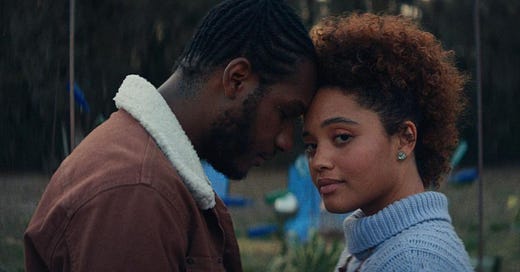Film Yap is a reader-supported publication. To receive new posts and support my work please consider becoming a free or paid subscriber.
I remembered digging Tayarisha Poe’s directorial debut “Selah and the Spades” (now streaming on Prime Video) more than I actually did, which made me want to review her follow-up feature “The Young Wife” (available in select theaters and on VOD beginning Friday, May 31). Alas, I liked the latter even less than the former. I’d call the picture a sophomore slump, but it’s kind of hard to do so when the films have gone from middling to piddling.
Celestina (Kiersey Clemons) is a young woman on the verge of marrying longtime boyfriend River (singer-songwriter Leon Bridges) during a retreat to Savannah, Ga. with their closest family, friends and a hanger-on named Dave (an amusingly obnoxious Jon Rudnitsky).
Family comes in the form of domineering mother Angelique (Sheryl Lee Ralph) (hers) and “Party Grandma” Cookie (Judith Light), scattered Mom Lara (Michaela Watkins) and overbearing, florally-named sisters Rose (Aya Cash), Daisy (Sandy Honig) and Fern (Lukita Maxwell) (his).
Friends (mostly hers) are Tessa (internet whipping girl Kelly Marie Tran – the Rose Tico actress deserved better from both fanboys and this flick) and gay guys (their names escape me despite Wes Anderson-esque character intros replete with title cards) played by Connor Paolo (late of the awesome “The Last Stop in Yuma County”) and “Search Party” vet Brandon Michael Hall.
“The Young Wife” isn’t a story so much as it’s a vibe … and it’s an irritating one at that. Celestina is nervous over her nuptials to the largely absent River and their family and friends’ incessant poking and prodding only exacerbates matters. She’s so on edge that she recently blew up at work and quit her financially rewarding but spiritually unrewarding job.
The biggest problem with “The Young Wife” is that its characters are mostly people I wouldn’t want to spend a minute and a half in an elevator with let alone an hour and a half of a movie. Poe’s “Selah” was affected but effective whereas this is affective but defective. I was almost as exasperated as Clemons’ Celestina.
The picture’s not without its charms, but they’re few and far between. I liked the performances of Clemons (the calm amidst the crazy) and Light (a curious mix of kooky and wise) and especially enjoyed their scenes together. There are some instances of creatively theatrical lighting to which I really responded, so kudos to Poe’s “Selah” cinematographer Jomo Fray with whom she’s reteamed. Lastly, I also dug the closing credits depicting the cast dancing, but I’m uncertain if they were actually cool or if I was just relieved that movie was finally over.





